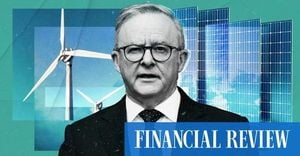Robert F. Kennedy Jr.'s potential appointment as the next U.S. Secretary of Health could reshape the pharmaceutical industry, stirring both concern and opportunity.
Recently, the healthcare sector has been marked by underperformance. Stocks associated with healthcare experienced significant declines, particularly after President Trump announced his nomination of Kennedy for the top health role. Historically, Kennedy has been vocal against vaccines and has criticized innovative drug developments, including recent treatments for obesity. This stance raises alarms among investors seeking stability as they eye the future of healthcare companies.
According to recent reports, Chugai Pharmaceutical reported record profits, but its forecast for 2023 appears uncertain with Kennedy's nomination on the horizon. The Japanese drugmaker reported a consolidated net profit increase of 19 percent, reaching 387.3 billion yen ($2.51 billion) for the fiscal year ending December, buoyed by strong sales from their hemophilia drug, Hemlibra. Yet, the potential shake-up at the U.S. Department of Health and Human Services, if Kennedy is confirmed, has investors skittish about future innovations impacting their bottom line.
Wall Street analysts have responded to the fluctuations caused by Kennedy's nomination, noting significant selling pressure on healthcare stocks and how it presents buying opportunities. Healthcare stocks have languished under the worst performance streak relative to the S&P 500 since at least 1991. Analysts from Janus Henderson, Citi, and State Street maintain optimism about the sector's future. They recommend viewing the current situation as overreaching pessimism on the market's part.
"We believe the selling is overdone, with the market not fully appreciating the acceleration of innovation in healthcare and overreacting to near-term headwinds," stated Andy Acker and Dan Lyons, portfolio managers at Janus Henderson. They argue Kennedy, if confirmed, would face limitations on halting the influx of groundbreaking drugs, due to the FDA's role, emphasizing the agency would likely be headed by someone with a balanced viewpoint.
Citi's analysts echoed similar sentiments after Kennedy's confirmation hearing, which was characterized as light on substantive revelations. During the session, Kennedy distanced himself from the anti-vaccine movement and expressed support for life-saving treatments like those for HIV. "His likely confirmation to lead HHS could provide measured upside to the healthcare sector," Citi analysts noted, showing optimism about stability and growth following the initial fears.
Meanwhile, experts like Michael Arone, chief investment strategist at State Street, predict healthcare stocks will outperform the broader market by late 2025. He pointed out the healthcare sector's weighting within the S&P 500 has plummeted to its lowest level since 1998, even as U.S. healthcare spending has ballooned from $1.4 trillion to $4.9 trillion since 2000.
"All this bad news for the Health Care sector creates an unloved investment opportunity with compelling valuations, ripe for upside surprises," said Arone. Growth projections suggest healthcare earnings will outpace general marketplace performance over the next several years—an encouraging forecast against the backdrop of increasing life expectancies and aging populations.
The demographic changes will undoubtedly influence healthcare spending patterns, pushing more funds toward preventive care and breakthrough innovations fueled by artificial intelligence. “Research will continue to develop breakthrough medicines for cancer, heart disease, and Alzheimer's,” praised Arone.
Given recent trends, healthcare stocks have begun to rally, outperforming the broader market recently—rising approximately 7 percent year-to-date compared to the S&P 500’s gain of 3 percent. Nevertheless, as anticipated by many analysts, the future with Kennedy at the helm remains unpredictable.
Throughout his confirmation hearing, Kennedy not only faced tough questions about his past remarks on vaccines but also criticism pertaining to his financial connections to law firms involved with litigation against vaccine manufacturers. His responses included no commitments to renounce any potential legal earnings from such cases. These controversies could potentially inhibit his ability to unite the healthcare sector behind necessary reforms and continue trust-building efforts needed for innovation.
The Centers for Medicare & Medicaid Services (CMS) has been proactive about addressing drug pricing reforms, emphasizing their commitment to transparency as they prepare for the next phase of price negotiations initiated under the Biden administration. Acknowledging historical pushback from the pharmaceutical industry against such movements, the agency remains determined to integrate lessons learned for producing efficient reforms.
The tension between Kennedy's appointment and various healthcare reforms could create significant ripples throughout the industry. Observers are anxious to see how his leadership will influence both public health initiatives and investor confidence moving forward. The intersection of Kennedy's controversial views and the burgeoning healthcare sector could very well determine the future dynamics of pharmaceutical innovation and stock performance.
Healthcare investors will need to watch the developments closely, considering the uncertain terrain if Kennedy is confirmed. Without doubt, the stakes are high, and the ramifications could extend well beyond the pharmaceutical sector itself. Only time will reveal the ultimate impact of Kennedy’s vision and regulatory approach as it relates to drug innovation and public health policy.



